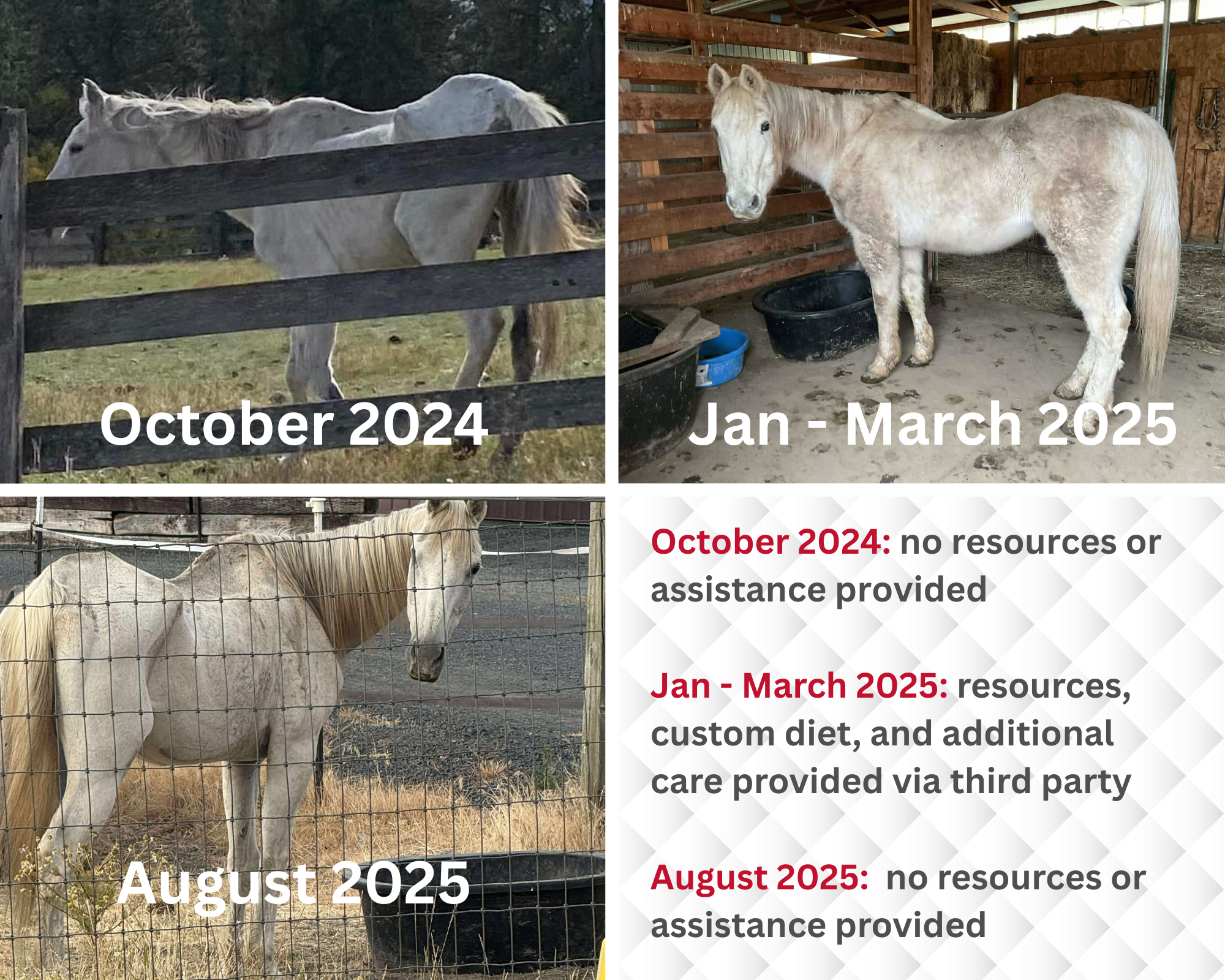Deputy’s Family at Center of Horse Neglect Allegations
A senior gelding named Popeye, once thriving under proper care, is now at the heart of a deepening animal neglect controversy in Latah County, Idaho. Animal advocates, community members, and rescue groups allege that Popeye’s prolonged malnourishment and untreated medical issues have been repeatedly reported to authorities and the Idaho State Department of Agriculture, only to be dismissed, ignored, or explained away. The horse’s owner is married to a Latah County Sheriff’s Deputy, raising serious concerns about conflict of interest and impartiality.
Reports Ignored, Warnings Unanswered
According to a case report from Horse & Halo and communications from concerned citizens, animal welfare complaints were submitted over the past two to three years to the Idaho Department of Agriculture, the Latah County Sheriff’s Office, and other agencies. Yet no enforcement action has been taken. Idaho State Veterinarian Scott Barnes reportedly attributed Popeye’s severe weight loss to his age, an explanation animal welfare experts call “misleading and inaccurate.” Age is not a disease.
The report clearly shows Horse & Halo’s CARE Program as proof that age is not to blame. While in the program, Popeye was provided a specialized mash diet, veterinary exam and teeth float at WSU, and blankets (it was January, and temperatures were extremely low at this time). His body condition visibly improved, and he regained weight, muscle tone, and energy. However, since the end of the program, the nutritional protocol was allegedly not continued, and Popeye has unfortunately fallen to a body condition score of 2 to 2.5. With winter approaching, advocates warn that the consequences could be deadly.
Medical Needs Ignored
On January 27, 2025, Popeye reportedly experienced a neurological event described as a seizure. Despite the potential seriousness, particularly in an already emaciated horse, no veterinary follow-up was sought by the owner.
It has also been noted on multiple occasions by the owner that Popeye has had persistent diarrhea following the discontinuation of the specialized diet, with no veterinary treatment obtained.
Advocates argue that this constitutes a clear breach of Idaho Code §§ 25-3504 and 25-3511, which mandate that owners provide adequate food, water, and necessary medical care. However, according to State Veterinarian Scott Barnes, Popeye is receiving the “minimum standard of care”.
A Documented Decline
Here is a timeline of the troubling sequence of events:
Aug. 16, 2022: Popeye’s original owner passes away, and custody of Popeye goes to the current owner, an LCSO Deputy and his wife.
Popeye in 2022 shortly after his original owner’s death.
Sept. 16, 2022: Neighbors note a decline in Popeye’s weight and health and document it in photos and texts.
Oct 2023: Neighbor obtains photos of Popeye and makes a report to Latah County Sheriff’s Office and Idaho State Department of Agriculture.
Oct 24, 2024: Owner acknowledges Popeye is severely underweight.
December 2024 – March 2025: CARE Program via Horse & Halo intervenes, providing specialized diet, veterinary exam, and blankets.
Jan 2, 2025: Veterinary exam and dental float at WSU reveals very few teeth; anti-inflammatory medication declined.
Jan 27, 2025: Neurological event; no follow-up care.
March 2025: Popeye graduates from the CARE Program. The owner stops using specialized feed due to cost concerns.
Jul 16, 2025 – Horse fed only once daily per owner; pasture has no nutrition. The owner offered assistance again through the CARE Program and declined the assistance.
Aug 6, 2025 – BCS remains dangerously low at 2 to 2.5.
Conflict of Interest Concerns
Given that the Owner is married to a Latah County Sheriff’s Deputy, animal welfare organizations are calling for all investigative responsibility to be removed from local authorities and placed with the Idaho State Police.
The case has now been formally referred to the Idaho State Police by the Idaho Animal Rescue Network and Horse & Halo, who say local agencies have failed to act despite clear evidence of neglect and violations of Idaho law. While the Latah County Sheriff’s Office did send information about this case to the Idaho State Police (District 2), they failed to submit a formal referral for an impartial investigation. As a result, ISP has not yet opened a formal investigation into this case.
Running Out of Time
Severe and prolonged emaciation in horses causes organ and metabolic damage, increases the risk of seizures, and carries up to a 20 percent mortality rate even with proper treatment. Recovery is slow and costly, and impossible if the neglect continues unchecked.
“This is not about age,” the report states. “This is about an owner choosing to ignore veterinary advice and proven feeding protocols, allowing a horse to slide back into a state that is not survivable long term, especially with winter on the way.”
Advocates are urging the Idaho State Police to immediately take custody of Popeye, secure a third-party veterinary evaluation at Washington State University, and review historical complaints to determine why prior reports were dismissed.
“This is exactly why conflict of interest provisions exist,” one advocate said. “When the owner’s spouse is in local law enforcement, there is a very real risk that an animal in distress will never get the intervention it needs. Popeye does not have the luxury of waiting for politics to play out.”
We are extremely grateful to Horse & Halo for their work on this case. Please consider donating to their CARE program at https://givebutter.com/OHGSv3.
Contacts:
Scott Barnes
ISDA Veterinarian
scott.barnes@isda.idaho.gov
Kerry Sandford
ISDA Livestock Investigator
kerry.sanford@isda.idaho.gov
Latah County Sheriff’s Office
ATTN: Sheriff Skiles
sheriff@latahcountyid.gov
Idaho State Police
district2@isp.idaho.gov




